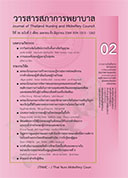Parents’ and Nurses’ Attitudes towards Parental Presence during Pediatric Invasive Procedures
Keywords:
attitudes, invasive procedures, parental presence, parents, nursesAbstract
Objective: To compare parents’ and nurses’ attitudes towards parental presence during pediatric invasive procedures
Design: Descriptive comparative study
Methodology: This study was conducted on two conveniently sampled groups. The
first group consisted of 100 parents of sick children, ranging from neonates to 15-year-olds, who were hospitalised in the pediatric care units, neonatal care units, wards for sick neonates, and pediatric wards of three tertiary hospitals affiliated to the Bangkok Metropolitan Administration. The second group consisted of 115 nurses stationed in their respective units or wards for a minimum of one year. Data were collected using a questionnaire on attitudes towards parental presence during pediatric invasive procedures. Descriptive statistics, independent t-test and
one-way ANOVA were used for data analysis.
Results: The parents’ and the nurses’ attitudes towards parental presence during pediatric invasive procedures were significantly different (p<.05). Also, nurses having different number of years of pediatric care experience and having served in different types of ward displayed significantly different attitudes (p<.05). However, the differences in the parents’ sexes, in their experience of being present with the children during pediatric invasive procedures, and in their children’s age groups did not result in the difference of parents' attitudes (p>.05).
Recommendations: Empirically developed guidelines for parental presence during
pediatric invasive procedures are strongly recommended, to efficiently increase the benefit of parental presence during invasive procedures
Downloads
References
Salmela M, Aronen ET, Salantera S. The experience of hospital-related fears of 4- to 6-year-old children. Child Care Health Dev 2011;37(5):719-26.
Charoensaen J. The participation of care giver in caring of hospitalizationchildren with illness and factors related. Mahasarakham Hospital Journal 2018;15(1):21-9. (In Thai)
McAlvin SS, Carew-Lyons A. Family presence during resuscitation and invasive procedures in pediatric critical care: A systematic review. Am J Crit Care 2014;23(6):477-84.
Mark K. Family presence during pediatric resuscitation and invasive procedures: The parental experience: An integrative review. Scand J Caring Sci 2020 Mar 22. doi:10.1111/scs.12829. Online ahead of print
Al-Abbass TM, Abdelkader RH, Shoqirat N, Obeidat H. The effect of parental presence in decreasing pain level for children during venipuncture. J Nurs Midwifery 2016;2(3): 12-9.
Saglik DS, Caglar S. The effect of parental presence on pain and anxiety levels during invasive procedures in the pediatric emergency department. J Emerg Nurs 2019;45(3) :278-85.
Barreto MdS, Peruzzo HE, Garcia-Vivar C, Marcon SS. Family presence during cardiopulmonary resuscitation and invasive procedures: A meta-synthesis. Rev Esc
Enferm USP 2019;53:1-13.
American Association of Critical Care Nurses. AACN practice alert: Family presence during resuscitation and invasive procedures. Crit care nurs 2016;36(1): e11-e4. doi: 10.4037/ccn2016980
Vavarouta A, Xanthos T, Papadimitriou L, Kouskouni E, Iacovidou N. Family presence during resuscitation and invasive procedures: Physicians’ and nurses’
attitudes working in pediatric departments in greece. Resuscitation 2011;82(6):713-6.
Ajzen I. Attitudes, personality, and behavior. Chicago: The Dorsey Press; 1988.
Corniero P, Gamell A, Cotanda PC, Trenchs V, Cubells CL. Family presence during invasive procedures at the emergency department: What is the opinion of spanish medical staff?. Pediatr Emerg Care 2011; 27(2):86-91.
Al-Sagarat AY, Al-Ghwyeen WS. Attitudes of health care providers toward the presence of family members during invasive procedures in children. Compr Child Adolesc Nurs 2016;39(4):272-86.
Al-Eissa M, Saleheen H, Yousif A, Al-Manea S, Al- Hijali B, Khan A. Parental presence during resuscitation and invasive procedures in the emergency department:
Saudi parents’ perspectives. J Nurs Care 2015;4(4):1-5.
González GS, Tomás RJ, Etxaniz JS. Family presence during pediatric emergency procedures: The perspetives of family and medical staff. Emergencias 2010;
:175-80.
Duran CR, Oman KS, Abel JJ, Koziel VM, Szymanski D. Attitudes toward and beliefs about family presence: A survey of healthcare providers, patients’ families, and patients. Am J Crit Care 2007;16(3):270-80.
Karapinar B, Yilmaz D, Egemen A. Mothers’ attitudes towards their own presence during invasive procedures on their children. Turk J Pediatr 2005; 47(1):46-52.
Meert KL, Clark J, Eggly S. Family-centered care in the pediatric intensive care unit. Pediatr Clin North Am 2013;60(3):761-72.
Fishbein M, Ajzen I. Belief, attitude, intension, and behavior: An introduction to theory and research reading. MA: Addison-Wesley; 1975.
Hedges LV, Olkin I. Statistical Methods for Meta-Analysis. Orlando, Florida: Academic Press; 1985.
Sanders MR, Turner KT. The importance of parenting in influencing the lives of children. In: Sanders MR, & Morawska A, editors. Handbook of parenting and child development across the lifespan [Internet]. Brisbane: Springer International; 2018 [cited 2020 June 6]. Available from: https://link.springer.com/book/10.1007%2F978-3-319-94598-9
Poompan P, Tilokskulchai F, Prasopkittikun T, Limprayoon K. Factors influencing parents’ uncertainty in chronicallyill children with intubation during critical period. Journal of Nursing Science 2012; 30(3):15-24. (In Thai)
Prasopkittikun T, Srichantaranit A, Chunyasing S. Thai nurses’ perceptions and practices of family-centered care: The implementation gap. Int J Nurs Sci
;7(1):74-80.
Abdelkader R, Arabiat DH, Holmes SL, Hamdan-Mansour A. Socio-demographic correlates of parents’ participation in care of a hospitalized child: A perspective from a developing country. J Child Health Care 2016;20(3):374-83.
Wongcheree T, Chaimongkol N, Pongjaturawit Y. Factors influencing parent participation in the care of hospitalized children. The Journal of Faculty of Nursing
Burapha University 2011; 19(3):23-6. (In Thai)
Benner P, Tanner C, Chesla C. Expertise in nursing practice: Caring, clinical judgment, and ehics. 2nd ed. US: Springer; 2009.
Sarsfield E. Differences between novices’ and experts’ solving ill-structured problems. Public Health Nurs 2014;31(5):444-53.
Srirat S, Saiwaree J. Needs and needs response among mothers of children hospitalized in the pediatric intensive care unit at Songklanagarind Hospital.
Songkla Med J.2008;26(5):481-89.








